
Books
ECONOMICS AND STRATEGY

It is said that the average person makes 35,000 decisions a day. Some, like whether to have oatmeal or eggs for breakfast, don’t carry a big downside risk since both are healthy food choices.
Others may.
Nearly three-quarters of executives surveyed recently said the number of business decisions they make daily has increased 10X over the last three years; 59% said they don’t feel confident making at least one of them.
More data isn’t always the answer, which many executives say can overwhelm and confuse rather than clear the path.
In a digital world dominated by network effects and platform solutions, frameworks are now essential decision-making tools for business leaders. The markets in which they compete are more dynamic, competitors less conspicuous, and decisions come with unprecedented layers of complexity. Yet, these dynamic markets create more opportunities for companies to reduce friction, save time, and overcome the inertia that can hobble innovation and new sources of value for customers.
Understanding how innovators can use new technologies and business models to navigate the friction, inertia and time continuum is essential to making digital transformation a successful outcome for their business.

Many of the most dynamic public companies, from Alibaba to Facebook to Visa, and the most valuable start-ups, such as Airbnb and Uber, are matchmakers that connect one group of customers with another group of customers. Economists call matchmakers multisided platforms because they provide physical or virtual platforms for multiple groups to get together.
In Matchmakers, David Evans and Richard Schmalensee, two economists who were among the first to analyze multisided platforms and discover their principles, and who’ve consulted for some of the most successful platform businesses in the world, explain how matchmakers work best in practice, why they do what they do, and how entrepreneurs can improve their chances for success.
“A must-read business book for ambitious entrepreneurs … thought-provoking insight into what’s behind the exponential growth of the companies in whose footsteps we’re following. It’s a portal through which to view the economy of the future.” — Daily Telegraph
“More than the Internet, the sharing economy or automation platform companies and matchmaking markets are defining the new economy. Evans and Schmalensee are pioneers in developing economic theories that explain this new economy. Here they share what they’ve learned to the great benefit not just of economists, but also of entrepreneurs, policy makers, and consumers.” — Lawrence H. Summers, Charles W. Eliot University Professor and President Emeritus, Harvard University; former US Secretary of the Treasury
Keywords: multisided platforms, two-sided markets, digital economy.
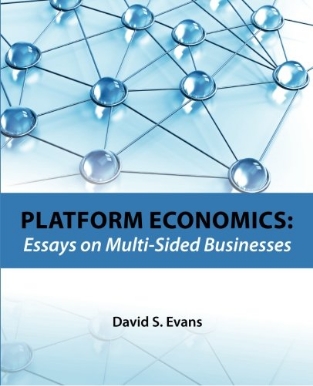
Platform Economics is based on a series of contributions the author made to the new field of multisided platform economics, and its application to business strategy and antitrust economics, between 2002 and 2011. After presenting the general framework and empirical evidence on the scope of platform businesses the economy the book presents detailed applications to the digital economy, payment systems, and software platforms.
Keywords: multisided platforms, two-sided markets, antitrust and multisided platforms, economics of multisided platforms
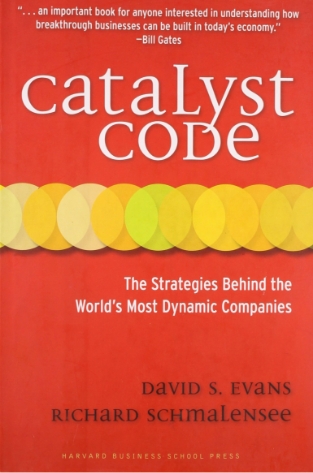
Successful platform businesses such as Google and Visa cracked the catalyst code-and they couldn’t have done it using traditional business strategies and tactics.
These two-sided businesses generate value by creating simultaneous and mutually beneficial relationships among the different groups of customers they serve.
In a book that challenges conventional wisdom about pricing, product design, organization, and incentives, David Evans and Richard Schmalensee provide the first step-by-step framework for launching and sustaining these dynamic businesses. They show why two-sided businesses, or catalysts, are today’s power brokers-and they are quickly disrupting existing industry ecosystems and gaining unprecedented prominence in the economy. And, most important, how entrepreneurs and businesses can make the most of the astounding opportunities.
“An important book for anyone interested in understanding how breakthrough businesses can be built in today’s economy.” — Bill Gates
Keywords: multisided platforms, business strategies for multisided platforms, start-up problem for multisided platforms
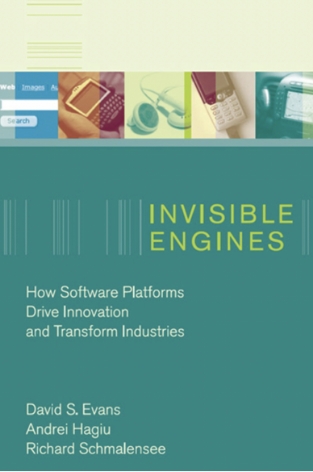
Software platforms are the invisible engines that have created, touched, or transformed nearly every major industry for the past quarter century. They power everything from mobile phones and automobile navigation systems to search engines and web portals. Evans and Schmalensee examine the business dynamics and strategies used by firms that recognize the transformative power unleashed by this new revolution — a revolution that will change both new and old industries.
The authors argue that in order to understand the successes of software platforms, we must first understand their role as a technological meeting ground where application developers and end users converge.
“The prose is accessible, even engaging. And the shrewd analysis backed up by a great deal of research and a precise narrative of recent business history more than makes up for the lack of office politics and entrepreneur heroics. Any executive looking to turn his company’s product into an engine of growth will want to consult Invisible Engines.” — Om Malik Wall Street Journal
Keywords: economics of software platforms, economics of operating systems, economics of APIs, software and two-sided platforms, platforms and digital economy
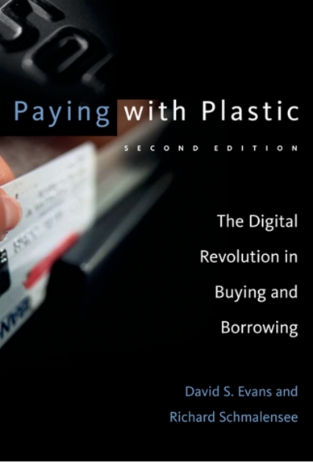
Paying with Plastic is the definitive source on an industry that has revolutionized the way we borrow and spend. It delivers an entertaining discussion of the impact of an industry that epitomizes the notion of two-sided markets: those in which two or more customer groups receive value only if all sides are actively engaged. The authors also examine the implications of the recent antitrust cases on the industry as well as other business and technological changes—including the massive consolidation brought about by bank mergers, the rise of the debit card, and the emergence of e-commerce—that could alter the payment card industry dramatically in the years to come.
“Paying with Plastic provides a rigorous analysis and deep insights about the payment card industry’s fascinating institutional features. This book will appeal not only to policymakers and business executives, but also to the theoretically inclined economist. A remarkable achievement.” — Jean Tirole, 2014 The Sveriges Riksbank Prize in Economic Sciences in Memory of Alfred Nobel 2014.
Keywords: history of credit cards, economics of credit cards, economics of payment cards, economics of Visa and Mastercard, interchange fees, credit cards and multisided platforms, innovation in payments
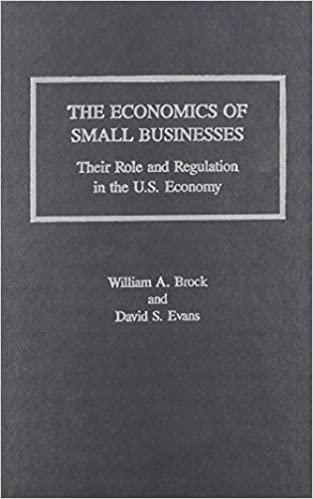
Small businesses are shown to comprise a substantial and expanding segment of the U.S. economy. The role of small businesses in the economy is considered from the standpoint of various economic theories of the size distribution of firms. Firm-size related empirical regularities are reviewed and their implications for economic theory is discussed. Several small-business policy issues are discussed, including the role of small businesses in labor, macroeconomic, and regulatory policies, along with a review of research on small-business economics that might help guide these policies.
Keywords: small business economics, self-employment economics, economics of entrepreneurship, role of small businesses in economy, effect of regulation on small businesses
ANTITRUST

The litigation that led to the breakup of the Bell System raised numerous economic issues, from whether the Bell System was a natural monopoly, that could not and should not have competition, to the competitive consequences of interconnection restrictions on local telephone exchange bottlenecks. The authors of these essays addressed these issues as experts retained by the U.S. Department of Justice in its successful effort to prosecute AT&T for violating the antitrust laws. Their work led to advancements in empirical and theoretical industrial organization including the now classic test for assessing whether a firm is a natural monopoly.
Keywords: U.S. vs. AT&T, breakup the Bell System, economics and the AT&T case, natural monopoly, scale economies in telecommunications, creamskimming, economics of telecommunications, economics of interconnection restrictions, economics of bottlenecks

This book explores the implications of the U.S. Supreme Court’s seminal decision on the antitrust analysis of platform markets. It written by two economists, David S. Evans and Richard Schmalensee, whose work on platform economics and payment systems was relied on extensively by the Court. The authors argue that the Court got it right in concluding that courts must take full account of the multisided nature of certain markets and the platform businesses that compete in them, and that criticisms of the decision are not supported by modern economics.
Keywords: antitrust of multisided platforms, antitrust of two-sided markets, US Supreme Court decision in American Express, American Express antitrust case, market definition for two-sided markets, economics of transaction platforms, antitrust and prices in two-sided markets
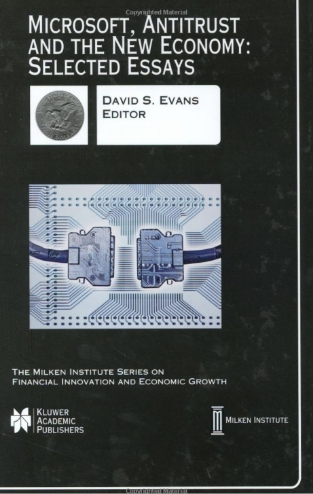
No antitrust case in recent history has attracted as much public attention as U.S v. Microsoft Corp. Nor has any antitrust case in memory raised as many complex, substantive issues of law, economics and public policy. The essays in this volume constitutes an early effort to analyze some of the central issues and to put the case in the context of the ongoing debate over the role of government in managing markets – especially in technology driven digital economy industries.
These essays were written by critics of the government’s efforts to break-up and regulate Microsoft.
Keywords: antitrust and dynamic competition, antitrust and winner-take-all competition, antitrust and innovation, antitrust and investment, Microsoft antitrust case, antitrust and the new economy

United States v. Microsoft is arguably the most important antitrust case of the past decade. It will have major implications for how governments regulate information technologies and the coming Internet explosion. It will also have important consequences for how businesses behave in the marketplace and in the political arena.
In this volume, key economists for the government (Fisher and Rubinfeld) and for the Microsoft (Evans and Schmalensee) llay out their views on the key issues and then respond to the views presented by the opposing side. The analysis, and the debate, illuminates many of the complex issues involved in assessing the appropriate scope for antitrust intervention in information technology industries.
Keywords: Microsoft antitrust case, Internet Explorer antitrust case, consumer welfare and Microsoft, economics of Microsoft antitrust case, U.S. v. Microsoft, economic experts in Microsoft case

Competition policy has grown explosively in the last quarter century. As of 2004, 102 countries, from Albania to Zimbabwe, had national competition laws on their books and authorities to enforce them.. But the sheer numbers just begin to define the extent of the revolution that has occurred.
Any corporation that wishes to expand, whether inside or outside its geographic borders, must learn the new rules of the game. Love them or hate them though, trustbusters are part of the game of competition. Countries that have embraced that sport for pursuing economic prosperity have almost all recognized that competition needs a referee. But trustbusters are not just referees; they have an institutional interest in preserving and promoting competition. Many antitrust authorities work to educate the public on the importance of competition and how competition advances consumer welfare. This book, with essays written by officials 22 global competition authorities, representing both developed and developing economies, defines the shape and scope of the expanded two-sided roles these trustbusters are creating inside this competition revolution.
Keywords: global competition policy, antitrust around the world, economics and global competition policy
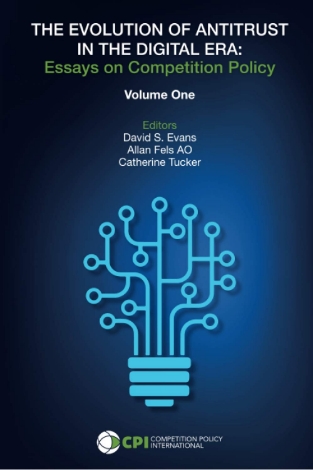
This two-volume collection of essays, by leading antitrust experts, covers the state of the art for antitrust thinking in digital markets in jurisdictions around the world. The issues it tackles are many: the role of innovation, the conundrum of big data, the evolution of media markets, and the question of whether existing antitrust tools are sufficient to deal with the challenges of digital markets. The resulting tapestry reflects the challenges and opportunities presented by the modern digital era, viewed through the lens of competition enforcement.
Keywords: antitrust and digital economy, antitrust and big data, antitrust and online media

Antitrust enforcement has turned its collective eye towards the global economy’s media markets. By highlighting the different regulatory approaches and various issues relating to the application of competition law to media markets in the United States, European Union, and Australia the essays, written by leading antitrust scholars and officials, offer profound insights for those seeking to better understand the nature of competition in this evolving area.
Keywords: antitrust and media markets, antitrust and online advertising, antitrust and social networks